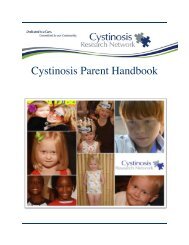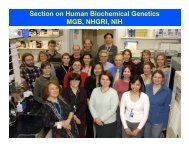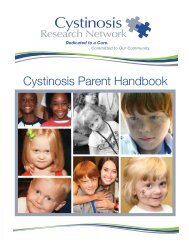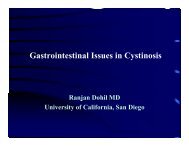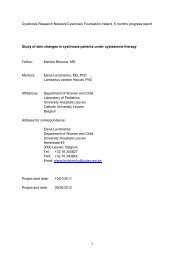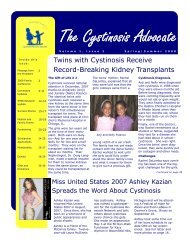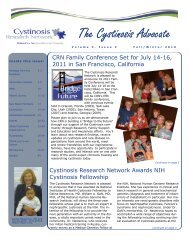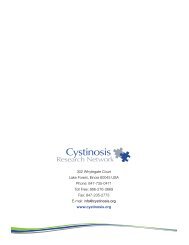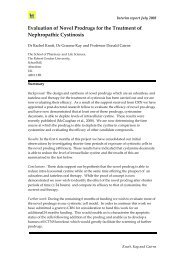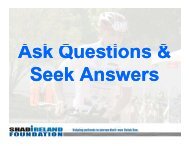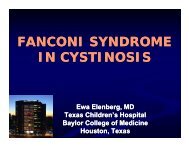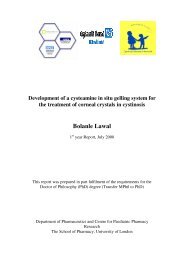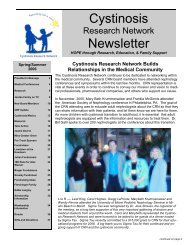Cystinosis Newsletter - Cystinosis Research Network
Cystinosis Newsletter - Cystinosis Research Network
Cystinosis Newsletter - Cystinosis Research Network
Create successful ePaper yourself
Turn your PDF publications into a flip-book with our unique Google optimized e-Paper software.
Page 15 The <strong>Cystinosis</strong> <strong>Research</strong> <strong>Network</strong> Fall/Winter 2006<br />
Continued from page 14<br />
Spotlight on Dr. Ewa Elenberg<br />
So I expressed my surprise and said. "Wow, you must be really crazy about these pretzels" and Colleen<br />
answered, "Oh, no, these are for Shea". This really did not make sense to me, so Colleen took some<br />
pretzels, gave one by one to Shea who licked all salt and discarded the rest, just to take another one to<br />
his mouth and to lick same way as the previous one. Then Colleen said, "This is what I call eating..." His<br />
inability to eat was so puzzling to me that I ran to the library to do a literature search but I found no information<br />
on eating problems in <strong>Cystinosis</strong>. This episode spurred my interest in finding out if there are more<br />
patients like Shea who have eating problems. I designed the survey and started calling some of the parents<br />
of children with <strong>Cystinosis</strong>, parents who knew Colleen and who were known to be supportive of research.<br />
I started collecting data and soon realized that eating problems were very common in <strong>Cystinosis</strong>,<br />
though not yet described in the literature. The more I interacted with the families over the phone, the<br />
more I become interested in this disease and the more I admired the families who really did not have<br />
much medical and psycholologic support. Everyone was eager to talk to me and did not complain that I<br />
was calling in the evening to answer the survey. I called one mother from Canada close to 10pm and<br />
when I found out that she was admitted to the hospital while being in labor, I tried to end the interview,<br />
but she wanted to answer my questions. She was very nice and enthusiastic and she was happy that I<br />
was asking her about the eating issues that she always felt her child had.<br />
This research project led to the initial description and to better understanding<br />
the spectrum of feeding problems in <strong>Cystinosis</strong>. It allowed<br />
me also to design the plan to help Shea learn to eat. I worked together<br />
with Shea’s mother trying to find methods of introducing a food<br />
to Shea as a part of daily routine. Initially we decided to use food as<br />
a play tool, allowing him to play with spoon, plates, food. Every evening<br />
he was sitting with the family at the table playing with his tomato<br />
pasta plate or soups spreading all around the table while the whole<br />
family pretended that nothing was happening. Shea was learning that<br />
food was a part of family life. I found out that Shea likes ice cubes, so<br />
I asked Colleen to freeze chicken broth and serve him as ice cubes.<br />
He liked it! Then we started experimenting more and more… Slowly,<br />
month after month we were able to see a small improvement, after 2<br />
years he was completely weaned off intravenous nutrition. Now Shea<br />
probably does not remember his past problems. He is 17 years old, a<br />
recent renal transplant recipient who enjoys eating!<br />
Shea and Kayla Hammond—When he<br />
was four years old, Shea inspired Dr.<br />
Elenberg to learn more about cystinosis.<br />
Since meeting Shea, I got to know many of you at various conferences.<br />
I have no words to express the depth of my admiration for you.<br />
You not only deal with daily issues of living with a complex chronic<br />
illness, but you also have energy to spend countless hours preparing the <strong>Cystinosis</strong> Symposia, taking<br />
your precious time off work to meet, to educate each other, to build up the strength fighting many obstacles.<br />
Every day is a new challenge, every day is a strenuous routine ruled by the clock. Your life is divided<br />
into hours, always remembering which medication to take or to give. Time without vomiting or discomfort<br />
is considered a "happy time". Since I met you, you have always been smiling, never complaining,<br />
never angry with the lack of knowledge by the medical staff. On the contrary, you are eager to teach<br />
all who want to learn, you are supportive of each other and doctors as well. You don’t assess blame but<br />
try to help us to understand the scope of issues and how to deal with them. You join the force together<br />
trying to "beat THIS THING", with dignity and positive thinking, with hope, not anger and despair... I cannot<br />
find better words to describe how I admire you. You, the patients and the families are my HEROES.



